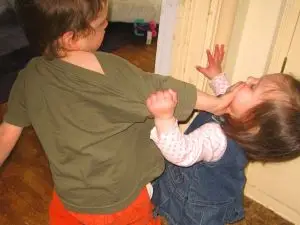“The question that’s probably uppermost in the child’s mind is: Why do my parents want to have a baby? Don’t they love me? And if t hey love me, why do they need another one? Aren’t I enough? Imagine for a minute yourself in a similar situation. Your husband comes home and says: “Honey I love you so much, I’ve decided to go get another wife so I can have two.” How would you feel?” Lawrence Balter
“The surest route to breeding jealousy is to compare. Since jealousy comes from feeling “less than” another, comparisons only fan the fires.” Dorothy Briggs
“Take two kids in competition for their parents’ love and attention. Add to that the envy that one child feels for the accomplishments of the other; the resentment that each child feels for the privileges of the other; the personal frustrations that they don’t dare let out on anyone else but a brother or sister, and it’s not hard to understand why in families across the land, the sibling relationship contains enough emotional dynamite to set off rounds of daily explosions.” Adele Faber
Sometimes trouble-free times are few. Parents may begin making the parental mistake of comparisons or competition. Which daughter has the prettier curls? Which is the taller child? How athletic are the boys? Who is stronger, braver, or has more intelligence or endurance? Which girl is smarter, cuter and feistier? If parents even venture to admit any attribute is better than any other, they have set the stage for fear, leading to worry, distrust, insecurity, envy, jealousy, anger, revenge, distancing, and emotional pain.Being honest with ourselves, we bear witness to our own emotional wounds carried over from our childhoods. Children who have health issues, must suffer with the life-long problems the illness entails. Are they less of a person? Physical and mental deformities are a fact of our lives. We cannot measure these problems as soul qualities or deficits. What we are as people, is what counts. I recall an intelligent person stepping into an elevator in a high-rise building to escape a fire. We should know that one can get trapped in such a situation. It is better to use the stairs. A mentally challenged child managed to call 911 for her mother who was unconscious. It is at those times we simply cannot judge astuteness as clearly as we think. Maybe brainpower has to do with thinking, caring observing.
Parents love their children. They don’t care if one is shorter or taller but for some strange reason even parents at times, appear to have the need to voice their observations. In so doing, they have started a competition, which ends with a winner and a loser. One is definitely shorter. Does being short mean you are lacking anything worth having? One child might have long beautiful curls. It doesn’t mean the long straight hair is less beautiful. These are only important attributes, if we set the parameters of what strength, beauty, or intelligence is according to man-made guidelines. Without the directives, we are all perfect and beautiful.
If one child brings home an awesome report card, and another child brings home a terrible report card, we must remember to refrain from comparing or even mentioning the good report card while dealing with the poorer one. They are two separate happenings and should be treated that way. The one child should be praised for the good work, but not necessarily flaunted in front of the other sibling. The child with the poor report card should be made to realize we are disappointed in their lack of effort and work ethic. If we know they have done their best, then we might be as excited with their grades as we are with their siblings’ grades. We don’t ever want them thinking we are disappointed with them as a person. Separating them from the report card makes it easier to talk to them about their grades, without deflating them as a person.
Never praise the poor report card if you are aware they can do better. Don’t compromise your beliefs in their capability to do better. We just don’t want to attach the grades to them as an innate quality, that belongs to our child. Explain how they are held in high esteem. They could have and should have done better. Our opinion of them as being respected and honored is secure. Our love for them is unconditional. What is considered not intact, is their work. They can change that. What they cannot change is their intrinsic qualities.
If we attack them, we are locking them into a bad place. They are not inherently attached to the grades. What their sibling produced, has no relevance to their work. Our desire for them to do better cannot be based on our child’s fear, of losing our love. In the end, they will tire of attempting to please us out of fear. Explaining the importance of school work and grades, and their connection to a job, is more important. If we base everything they do on fear, they will simply give up and believe they can’t measure up to a brother or sister. We lose and so do they.
A child who might have been a good athlete, has given up playing ball, because we mentioned they were better with school books and their sibling was better at sports. Now we have few options with the scenario we have instigated. Forcing children into situations they are uncomfortable with, may leave them exploding in anger. This results in screaming and threats, producing more anxiety. Now the child may loathe themselves and worry their parents detest them also.
We can control some parts of the situation. We can admit we’re not happy with the grades. They are capable of improvement, we might emphasize. We can take some measures to help them. Set some time for them to study, to ensure better grades. Never should we say, “Look how hard your brother works.” “Look at the time your sister spends on homework.” Really, this is not going to improve the situation. If it does you have only placed more doubt and conditional love into the already taxing problem. You have also started a sibling rivalry which corrodes the sibling relationship. You want to teach the importance of school not the comparison of siblings. Sticking to the problem is relevant.
“What counts is the freedom to not have to count.” Anonymous
“Most parents aren’t even aware of how often they compare their children. Comparisons carry the suggestion that specific conditions exist for parental love and acceptance. Thus, even when one child comes out on top in a comparison she is left feeling uneasy about the tenuousness of her position and the possibility of faring less well in the next comparison.” Marianne Neifert
“Eventually we will learn that the loss of indivisible love is another of our necessary losses, that loving extends beyond the mother-child pair, that most of the love we receive in this world is love we will have to share–and that sharing begins at home, with our sibling rivals.”
Judith Viorst


